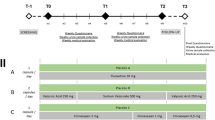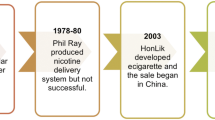Abstract
Rationale. Epidemiological, clinical and pre-clinical observations suggest that caffeine can potentiate the reinforcing and discriminative effects of nicotine.
Objective. The present study examined whether chronic exposure to moderate doses of caffeine affects the reinforcing and subjective effects of intravenously administered nicotine.
Methods. The effects of oral caffeine maintenance on the subjective and physiological effects of intravenously administered nicotine and caffeine were examined using double-blind methods in nine volunteers with current use of tobacco, caffeine, and cocaine. Each subject was exposed to two chronic drug phases (200 mg/70 kg oral caffeine t.i.d. and placebo t.i.d.), each of at least 12 days duration. Within each drug phase, the subject received intravenous injections of placebo, nicotine (1.0 and 2.0 mg/70 kg), and caffeine (200 and 400 mg/70 kg) in mixed order. Physiological and subjective data were collected before and repeatedly after drug or placebo injection.
Results. Both intravenous nicotine and caffeine produced significant increases in ratings of drug effect, stimulated, rush, and bad effect, with only nicotine significantly increasing ratings of liking and good effect. Caffeine maintenance significantly increased ratings of drug effect and stimulated after the high dose of nicotine, and significantly decreased ratings of bad effect after the low dose of nicotine. Caffeine maintenance also significantly increased the identification of the low dose of nicotine as a stimulant. A drug versus money measure of reinforcement showed that subjects were willing to pay money to receive nicotine injections, but willing to forfeit money to avoid caffeine injections. Furthermore, subjects were willing to pay significantly more money to receive the high dose of nicotine in the caffeine maintenance phase than in the abstinence phase. Both intravenous nicotine and caffeine increased diastolic blood pressure and decreased skin temperature, and nicotine also increased heart rate. These physiological effects of intravenous nicotine and caffeine as well as the subjective effects of intravenous caffeine were not influenced by caffeine maintenance.
Conclusions. The results extend recent clinical and preclinical findings by showing that oral caffeine maintenance can potentiate the reinforcing and stimulant subjective effects of nicotine.
Similar content being viewed by others
Author information
Authors and Affiliations
Additional information
Electronic Publication
Rights and permissions
About this article
Cite this article
Jones, H.E., Griffiths, R.R. Oral caffeine maintenance potentiates the reinforcing and stimulant subjective effects of intravenous nicotine in cigarette smokers. Psychopharmacology 165, 280–290 (2003). https://doi.org/10.1007/s00213-002-1262-4
Received:
Accepted:
Issue Date:
DOI: https://doi.org/10.1007/s00213-002-1262-4




